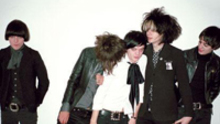The very last thing Mike Hadreas (aka Perfume Genius) says to me during our conversation in some Shoreditch forecourt is both a decent summary of the energies behind his new record, and a microcosm of his approach to answering questions: “I wanted to make something you can listen to for a long time.”
Sounds straightforward enough; appealingly simple, if a little awkward. Much like the five or six lines one remembers from Learning, the ten thumbed-out piano arpeggios with a few scraps of lyric sung over the top that became the most devastating album of 2010. Not that Hadreas had any idea it, or indeed Perfume Genius, would ever exist when he wrote the songs at his mum’s house, in the wake of now-much-documented drink and drug troubles.
And true as well: Put Your Back N 2 It (a title pitched somewhere between Prince and Placebo, I can’t help thinking – a kinda terrifying place to be) is a collection of songs one can hear three times in a row without losing the desire to listen to it again. Not to mention one I can see myself returning to variously in the future. Just pretty enjoyable really, although recent articles might have given folk a different impression: “the track by track by Pitchfork on the new songs, they just picked all the nastiest shit, like, ‘this song’s about gay porn’ etc.,” laughs Hadreas at one point.
For me, though, that closing statement is most interesting for its subtext. One which acknowledges that Learning isn’t an album one can listen to for very long – it’s too close, too sad. And which suggests that his debut might not have necessarily been the record Perfume Genius “wanted” to make, per se – needed is probably a better word. But which also hints at an awareness that it is Learning for which he is likely to be remembered, regardless of what he does next.
Put Your Back N 2 It is highly listenable, sure. But it is also rather forgettable. And it is the layers of subtext that are characteristic of the interview as a whole. Hadreas’ responses are sort of bedded down within a mess of contradiction (he “doesn’t care” what people think, but is also “freaked out” about the reception awaiting the new album), rehearsed lines (I get the same “if Rick in Pittsburgh isn’t going to like it” shtick as Pitchfork got), nervous fuckwords, and the kind of stop-start mumbled non-sentences that get in the way of eloquence like nothing else. I quote: “So I’m not really, but – as far as, like – you know, I don’t, haven’t, really collaborated with anybody, or – it’s all pretty – even Alan, I don’t ever write when he’s home. It’s all by myself so – that’s how I like it.” Hmmm.
But there’s a lot of truth in them too. In many ways, the half hour I have with Hadreas constitutes the most sensible discussion about second-album-writing I’ve got out of anyone. Which is I guess every bit as disconcerting as, oh I don’t know, a two-minute song with 30 words containing more meaning than an entire Bon Iver record.
On the subject of which…
DiS: There’s a tradition of musicians writing introspective, personal first records, then opening up into big choruses etc. on their second. Recent examples being Bon Iver emerging from the woods, and Antlers following up a record about terminal illness with the occasionally groovy Burst Apart. Were you aware that you were following a path a lot of artists seem to take after intense debuts, or did it still feel totally personal?
PG: Honestly, I just kind of did it. I didn’t really know that historically there’s a pattern of weird basement people coming out of the basement and making like, “check it out, I’m here!” I knew I wanted to be more clear, and have the vocals be higher up, even though I still wanted to bury them. That’s why I liked having someone else there, because they like kept turning them up – the producer I mean.
I listened to that Bon Iver album and after the first 30 seconds, I shut it off, I thought fuck that. It was just so big-sounding. I mean, I fucking love Phil Collins too. But there were like, 30 Bon Ivers, and some of them are children, and some of them are in the woods, it’s all “aaaah” and “ooooh”. So I turned it off. I’m glad that I don’t take it so seriously when I’m making it, or think that it’s amazing after it’s done – I’ll think it will be shit. I just needed to realise that I’m just going to do what I’m going to do.
I mean, I knew I wanted to be deliberate about everything – I didn’t want to just go through my diary again and make cloudy things, and then every once in a while write a snippet about something that happened ten years ago. I didn’t want to do that again.
DiS: You’ve still very much emphasised the personal in these new songs, though, on your Matador track-by-track commentary, and in other interviews. Did the more deliberate approach feel like a kind of obstruction, a distancing between you and the song, in a way that wasn’t there on Learning?
PG: Well some people make really powerful music that’s also distant and cold, but I’m just incapable of doing that and still feeling like there’s a purpose to it. But yeah, a little bit of distance. I thought a lot more about other people when I was making this music. I think that helped. If it was just me bearing my soul on a grander level… although it did actually feel like I was doing that too. But it wasn’t all about me. Does that make sense?
DiS: Sure – does that mean writing about other people was a reflection of your emotional present, and writing about yourself would have felt like looking back to a “troubled past” that is actually, I guess, quite distant now?
PG: Yeah. I mean, what’s weird is that getting better, healing, my circumstances have all gotten real better, but I didn’t match up with them all the way. Like how I feel about myself didn’t. And it’s a really awful, embarrassing feeling to realise how ungrateful you are, however natural that is…
[Twenty second pause.]
I was trying to make music that that didn’t factor into. Where I was thinking about what was really going on, about how confusing it can be to get better sometimes, and while I’m doing all this my family’s there, because we actually have relationships now, I’m not disappearing! And I’ve been to recovery meetings, and I’ve seen that I’m not the only one that’s fucked up.
DiS: How did you respond to the religious side of those meetings?
PG: You know what, I’ve tried a lot of other shit, and it didn’t work. But this has worked for some people who I seriously didn’t think were ever going to get better, so I mean, even if it’s a fucking cult, it’s a cult that means people have a better life for themselves. I needed it at first, really bad.
I thought for a long time it was just the drinking and drugs, and then when I took those away, I realised that I was just completely fucked. It’s really shitty, but it’s also really, I don’t know – it makes you feel like a little kid. That’s what I felt like a lot when I made the first album, like I’d never really stopped to pay attention to anything that had happened to me, anything that I was feeling.
DiS: It’s interesting you say that, about being a kid, because so much of the eloquence of Learning was a product of simplicity, rather than angst – in terms of both its form and its content…
PG: A lot of those songs for me, I was kind of excited, even though they were really depressing, I was probably happier when I was making that album than I had been for years and years. Course, a little bit was that I’d never done it before, so that’s all that I could really manage. But also, I think that if I’d had time to practice, I would have done the exact same thing.
That’s just how I like it, really, I like to distil things down to something really simple. I mean, Joanna Newson makes seventeen minute-long songs, and all seventeen minutes are really good – I don’t think you have to be brief to get your point across. But it tends to be what I respond to the most, usually, in other people’s work – when things are not super heavy-handed. That’s what was kind of hard being in the studio this time, we went over things so much that I could forget what the message was at first, and think I had to like, fucking, shove it down people’s throats, if I listened to it enough. I think what helped with the first album was that I made songs one day, and then I didn’t go back to them.
DiS: There’s a song on the new album, ‘Dirge’, that’s based on an Edna St. Vincent Millay poem. Do you see yourself as part of the kind of official “confessional” tradition?
PG: I’d like to think so! I mean, that’s the stuff I like – they’re the things I like investigating online. The thought at the beginning was that I was this kinda outsider artist, like Daniel Johnson or something, “I’m crazy!”, that Learning is what I made because that’s how fucking crazy I am.
DiS: Aren’t you ever cynical, about earnest stuff?
PG: Well yeah, I’m a bitch! About a lot of things. But that’s not real. That’s what’s kind of cool about making music, because I can be really cynical in my day-to-day life, but when I sit down and make things, for some reason – and I’m really grateful for it – I just fucking leave all that behind. I hope that’s what I’m doing, anyway.
DiS: Do you see yourself as a gay artist?. (This question has become particularly significant in the days following this interview, thanks to this lamentable state of affairs.)
PG: Well I am. That’s a weird role, even my boyfriend is kind of squinting at me a little bit about how gay I’m promoting the second album. You know, I think it would be unkind of me to other people if I was trying to not have any shame about everything else, and then I held back about this one thing. So even if it fucks me, no pun intended, or pigeonholes me, if Rick from Pittsburgh isn’t going to want to hear it because I wore lipstick once, well…
DiS: I’m not necessarily talking about that, so much as the fact songs on the new record deal with the contemporary experience of being a gay man, in a way that I think is quite important. Like ‘17’, which is about body image issues in gay culture, and ‘All Waters’, about you and your boyfriend Alan only being able to hold hands in certain parts of Seattle…
PG: Well firstly ‘17’ was about how I have felt inside about things. But I never really thought: I was just angry, for a long time, and victimised by whatever had happened to me, you know? And I realised that I have a big part in how I go about everything, how I think about it.
And ‘All Waters’, it’s just what you got to do. It’s just how it works. I could either be pissed off about it, or investigate it. But it’s definitely more scary to do it this way, to be more specific – but then I want to make sure that I don’t do anything because I’m scared. It’s hard to explain, when I’m doing it it’s really multi-tiered, I think about everything obsessively, but when I have to explain it, I can’t. I get worried that, like, the second song on the album is pretty straightforward, it’s just “me and the guitar,” and me talking about blahblahblah, I don’t know. It’s just how I like to do things – it’s kind of embarrassing…
DiS: There are certainly a hell of a lot more tiers on Put Your Back N 2 It – I mean, a track like ‘Take Me Home’ almost sounds like a Phil Spector production. Was it difficult being specific, and honest, while juggling all this other stuff?
PG: That song was one of the most deliberate ones, because I made the album without it, and without the single ‘Hood’ at first, and I gave that to my label. And they wanted me to write more pop singles, so I was like, I want to write something with drums and shit, but about something fucked up, or something that’s not necessarily pop-worthy. I mean, it’s not like it makes it a caricature, I’m still dead serious, like everything else I do. But I was thinking about how the song worked a lot more.
DiS: That sounds like a bit of a thoughtless label demand…
PG: It’s fine – I’m proud of those two. It was fun, too, because it kind of reminded me that no matter what I do, I’m going to end up doing the same thing. Pretty much, that I’m not going to be cool. That’s what happened when I first started writing: I knew people were going to be listening to it, and I was just like, “I’m going to make something really cool this time, it’s going to be super hip and shit,” and it’s just: I can’t do it.
I laugh at, like, the end of ‘Hood’, because I gave the drummer instructions of what I wanted, but I didn’t know he was going to be all like PAM-PUMPUM-PAM. I played it for Alan and he laughed. But I fucking love it, so…
DiS: The problem, of course, is that it’s resulted in songs that I think could be accused of sounding like other songs, like Antony and the Johnsons, a bit like Cat Power – your first approach was so genuinely unique, whereas this one feels a lot more familiar…
PG: If I thought like that I don’t think I’d get anything done. It’s just going to happen how it’s going to. And I would get worried about this sometimes, because I would listen a week later and be like, “that sounds like this one song I really like.” You don’t know that while you’re doing it – or sometimes you do a little bit. But then I was thinking that there’s 30 million bands that sound exactly like Ian Curtis is singing, not even apologetic about it, they’re just straight up singing like him. And people are like, “oh, clapclapclap, that’s amazing!” And so maybe I’m referencing things that aren’t as – but that’s alright, because I don’t care.
DiS: That aren’t as…cool…
PG: Yeah. When I think about all the music that I like to listen to, it could have been written at any time, and it sounds like a million other things: it’s really straightforward, like folk music, that’s what I’ve listened to a million times. I haven’t listened to, like, the Dirty Projectors obsessively for years and years, even though they’re really good. You know what I mean? So I think – this time, I wanted to make something that you can listen to for a long time.
Put Your Back N 2 It is released on 20 February 2012.























